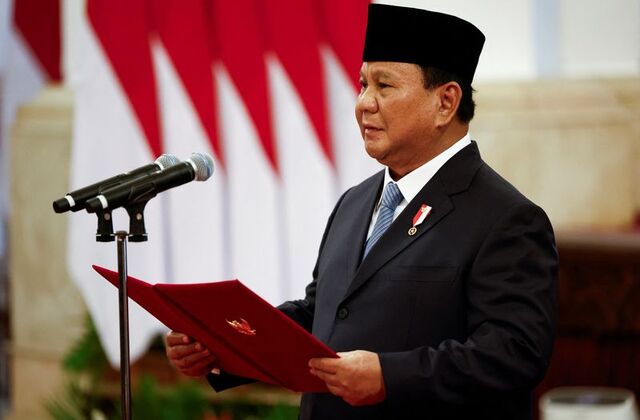Indonesian President Prabowo Subianto has chosen China for his first official foreign visit since taking office, marking a significant step in the relationship between the two countries. This decision comes only about two weeks after his inauguration, showing the priority he places on strengthening Indonesia’s ties with China. Notably, this is Prabowo’s second visit to China this year. He had previously visited the country as defense minister before his presidential win, but now returns in his new role as Indonesia’s head of state.In the changing global politics, Indonesia holds the key to become superpower for US and China.
According to China’s Foreign Ministry, this visit is seen as a strong signal of Prabowo’s commitment to advancing the relationship between Indonesia and China. The Chinese government has welcomed the visit, emphasizing the importance of cooperation and high-level trust between the two nations. Prabowo’s visit, they say, will help drive political cooperation to new heights and strengthen mutual interests.
Indonesia’s relationship with China has grown over the past years, especially under the leadership of former Indonesian president Joko Widodo. During his term, Widodo visited China eight times and met with Chinese President Xi Jinping 12 times, reinforcing a new era of collaboration and shared goals. As Prabowo now steps into office, his administration continues this diplomatic legacy, aiming to build upon the strong foundation established over recent years.Elon Musk’s Starlink Sparks Controversy in Telecom Sector in Indonesia
Economic Development and Trade: A Key Focus
A core priority for Prabowo’s administration is economic development, a focus that aligns well with his visit to China. Indonesia’s foreign policy has traditionally been one of neutrality, avoiding alignment with any specific world power. However, Prabowo’s approach includes actively seeking out international partnerships that benefit Indonesia’s economic interests. China plays a crucial role in these ambitions, as cooperation between the two countries has already brought significant economic benefits to Indonesia.
China has been Indonesia’s largest trading partner for 11 years, with their bilateral trade exceeding $100 billion in 2023. This thriving economic partnership goes beyond just trade, as China has also become Indonesia’s second-largest investor among ASEAN countries. Chinese investments support numerous infrastructure projects across Indonesia, providing both economic growth and job opportunities for local communities. For example, Chinese firms have contributed to large-scale construction and manufacturing projects, which are vital for Indonesia’s development goals.President Jokowi: Indonesia’s Decisive Anti-Money Laundering Crusade
Indonesia’s economic collaboration with China is also strategic, as both countries seek to strengthen their regional influence. By working together, they aim to foster greater economic stability in the Asia-Pacific region, creating opportunities not just for themselves but also for other countries in Southeast Asia. This cooperation benefits both nations, as it allows Indonesia to advance its development plans while China gains a valuable ally in the region.
Building an Independent and Inclusive Global South
Both Indonesia and China are prominent members of the Global South, a term that refers to countries in Latin America, Africa, Asia, and Oceania that are working to build economic and political independence. As leaders in this movement, Indonesia and China aim to promote what they call “true multilateralism,” which encourages collaboration among countries without dominance by any single nation.Boeing Fraud: Shocking Guilty Plea in 737 Crash Scandal of Indonesia and Ethiopia
By coordinating their efforts, China and Indonesia seek to create a world that values fairness and inclusivity, where each country has an equal say in global decisions. This shared commitment to strategic independence aligns well with Indonesia’s traditional policy of nonalignment. While Indonesia avoids getting involved in conflicts between major powers, it also takes an active role in shaping a fair global order. Both Indonesia and China are committed to promoting an equal and multipolar world, which would allow developing countries to contribute more to international discussions on trade, security, and environmental issues.
Prabowo’s visit to China underscores Indonesia’s willingness to engage in partnerships that align with these principles. As China and Indonesia strengthen their ties, they hope to set an example for the rest of the region, encouraging peaceful cooperation without interference from outside powers. In recent years, the Asia-Pacific has become a hotspot for competition among major global powers. However, China and Indonesia believe that by working together, they can counterbalance these tensions and create a region that supports economic growth and regional stability.
Prabowo Promoting Strong Partnerships
Through his visit to China, Prabowo emphasizes the importance of mutual respect and cooperation in international relations. Both governments have expressed optimism that the outcomes of this visit will benefit not only their countries but also the wider region. With strong partnerships and a commitment to inclusive growth, Prabowo and his Chinese counterparts seek to foster a stable and prosperous environment in Asia.
By choosing China as his first international destination, Prabowo’s new administration reinforces Indonesia’s commitment to building a world based on mutual respect and collaboration, positioning itself as a strong and independent player in both regional and global affairs. This visit symbolizes not only a continuation of long-standing partnerships but also an opportunity to strengthen ties that bring tangible benefits to both nations and the Asia-Pacific region.


